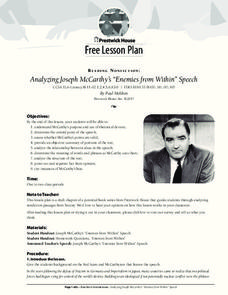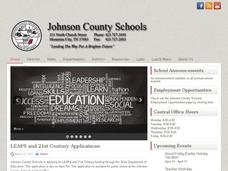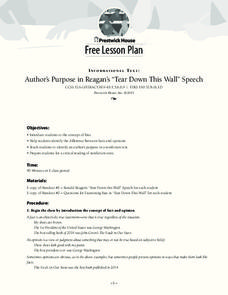Curated OER
"The Clever Monkey"
Second graders complete a variety of activities related to the book "The Clever Monkey" by Rob Cleveland. They answer story comprehension questions, and rewrite the story. Students also complete a comprehension and fact or opinion...
Prestwick House
Reading Nonfiction: Analyzing Joseph McCarthy's "Enemies from Within" Speech
Looking for a instructional activity that teaches class members how to analyze nonfiction? Use Joseph McCarthy's famous "Enemies from Within" speech as a instructional text. Worksheet questions direct readers' attention to the many...
Curated OER
Active Reading with American History
Explore connections within and between informational texts with this lesson about encyclopedia articles. Middle schoolers write encyclopedia articles focusing on topics in American history. They discuss how to determine credibility...
Curated OER
Lesson 2: Distinguish Fact from Opinion in Books
An important part of reading informational text is being able to discern fact from opinion. The class reads chapter one from the book, Penguins by Lynn M. Stone. They analyze specific sections of the text to determine if what is being...
Curated OER
Fact and Opinion Project
Students draw an illustration of facts and opinions gleaned from a newspaper. In this fact and opinion instructional activity, students read a newspaper and write down specific information. Students illustrate their facts and opinions on...
Curated OER
Martin Luther King Jr.: A Fact Or Opinion Activity
Students discuss the difference between fact and opinion, then read a brief biography of Martin Luther King Jr. They complete the Martin Luther King Jr.: Fact or Opinion worksheet.
Curated OER
It's Your Opinion
Everyone has a different opinion about the characters they read about in books. Have your class explore forming an opinion and finding evidence to support it as they read and discuss what they think about a particular character. They...
Curated OER
Determine Fact and Opinion
In this fact and opinion worksheet, students read sentences and label the sentences as either a fact or an opinion. Students complete 12 problems.
Curated OER
Fact or Opinion
For this fact or opinion worksheet, students read sentences and label them as either being facts or opinions. Students complete 12 problems.
Curated OER
Fact or Opinion?
Third graders design a political cartoon. In this fact and opinion activity, 3rd graders examine political cartoons and distinguish fact from opinion. Students create a political cartoon on the topic of their choice.
Curated OER
8th Grade Reading Comprehension Success
Augment your eighth grade language arts curriculum with a thorough set of reading comprehension activities and assessments. Focusing on a variety of skills, including vocabulary in context, text structure, main idea, and author's style,...
Curated OER
Creature Feature Poetry Keyword Search!
Young scholars examine the differences between fact and opinion, and brainstorm ideas for a keyword list by analyzing facts. They listen to poems, and create posters listing three keywords about each creature featured in the poetry.
Curated OER
A Way with Words
How do facts and opinions impact the news? After reading "How to Cover a War" from the New York Times, middle schoolers evaluate the claims in the article. They also consider the media's responsibilities in reporting during wartime....
Curated OER
That Is Not My Opinion!
Being an informed citizen requires distinguishing fact from opinion and understanding persuasion methods. Secondary learners evaluate newspaper editorials. They read opinion pieces, identify the writer's purpose and position on an issue,...
Prestwick House
Author’s Purpose in Reagan’s “Tear Down This Wall” Speech
President Ronald Reagan's "Tear Down This Wall" speech, delivered on June 12, 1987 before the Berlin Wall, provides class members with an opportunity to examine three key aspects of informational text: author bias, the use of facts and...
Curated OER
Understanding and Using Primary and Secondary Sources in History
Explore primary and secondary sources in this historical analysis lesson. Young researchers define the terms primary source and secondary source. They read a primary source document provided by the teacher and answer questions about the...
Curated OER
Fact vs. Opinion
Students explore fact versus opinion in reading material. They listen to sentences and use hand signals to identify if the sentences are facts or opinions. After reading a story, they vote on sentences for facts and opinions and stae a...
Curated OER
Fact and Opinion
Students determine the difference between fact and opinion. They identify facts and opinions in a report. Students discuss the porportion of fact and opinion in a report. Students write a profile of the place they live and evaluate facts...
Curated OER
Fact V. Opinion
Students distinguish between fact and opinion when reading material. They use statements of objects to determine if they are facts or opinions.
Curated OER
Fact and Opinion Race
Third graders differentiate between fact and opinion. They determine if a statement is a fact or an opinion. Students race to be the first team to make it to the finish line while determining if statements are facts or opinions.
Curated OER
Determining Author's Point of View: The Sneeches
Determine the author's point of view in a text. Young readers read Dr. Seuss' The Sneeches and identify the author's purpose in the story. They identify persuasive techniques in writing, asking and answering questions to better...
Newseum
The Fundamentals of News
A short video introduces middle schoolers to different media-related news terms. Viewers then complete a worksheet and discuss the differences between news and journalism, between facts and opinions.
Curated OER
The Jacket: Journal Templates Teacher's Guide
Explore this story involving prejudice and racism to enhance learners' comprehension skills. The story The Jacket by Andrew Clements involves an African American boy who is falsely accused of stealing someone's jacket. This teacher's...
Curated OER
CHRISTMAS FILM REVIEW
Students write reviews of films they have seen over the Christmas holidays. They study what the ingredients of a film review are, and examine the difference between fact and opinion.

























